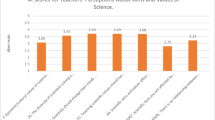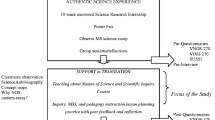Abstract
The purpose of the study was to determine what percentage of Palestinian science teachers held beliefs about knowledge and learning that are congruent with the recent constructivist/conceptual change epistemological basis of science education, what factors influence these beliefs, and if the beliefs about knowledge and learning were related. Two questionnaires were developed to probe teachers' beliefs in these two areas, and a sample consisting of 91 teachers with varying educational background and teaching levels responded to these questionnaires. The study showed that only a small percentage of Palestinian teachers subscribed to the recent views of learning and scientific knowledge (25% and nine percent respectively). With regard to the views of learning, this was mainly due to very few teachers believing or realising that students hold alternative preconceptions and that science learning entails conceptual change. Very few teachers also believed that science itself develops through conceptual change. Indeed, more than 80% believed that science develops through accretion and about 40% preferred the inductive model of science to the hypothetico-deductive one which only 11% preferred. It was found that these views were not related to the teachers' years of schooling, years of experience, level at which they taught, or teacher specialisation. The two views of learning and knowledge were moderately related. The results and implications for future studies are discussed.
Similar content being viewed by others
References
Aikenhead, G. S., Fleming, R. W., & Ryan, A. G. (1987). High-school graduates' beliefs about science-technology-society. I. Methods and issues in monitoring student views.Science Education, 71, 145–161.
Allen, M. J., & Yen, W. M. (1979).Introduction to measurement theory. Monterey, CA: Brooks/Cole.
Benson, G. D. (1989). Epistemology and science curriculum.Journal of Curriculum Studies, 21, 329–344.
Billeh, V., & Malik, M. H. (1977). Development and application of a test on understanding the nature of science.Science Education, 61, 559–571.
Carey, L., & Stauss, N. G. (1968). An analysis of the understanding of the nature of science by prospective secondary science teachers.Science Education, 52, 358–363.
Cheung, K. C., & Taylor, R. (1991). Towards a humanistic constructivist model of science learning: Changing perspectives and research implications.Journal of Curriculum Studies, 23, 21–40.
Cleminson, A. (1990). Establishing an epistemological base for science teaching in light of contemporary notions of the nature of science and how children learn science.Journal of Research in Science Teaching, 27, 429–445.
Driver, R. (1983).The pupil as scientist? Milton Keynes, England: The Open University Press.
Elkana, V. (1970). Science, philosophy of science and science teaching.Educational Philosophy and Theory, 2, 15–35.
Etchberger, M. L., & Shaw, K. L. (1992). Teacher change as a progression of transitional images: A chronology of a developing constructivist teacher.School Science and Mathematics, 92, 411–417.
Gallagher, J. J. (1991). Prospective and practicing secondary school science teachers' knowledge and beliefs about the philosophy of science.Science Education, 75, 121–133.
Hashweh, M. Z. (1985)An exploratory study of teacher knowledge and teaching: The effects of science teachers' knowledge of subject-matter and their conceptions of learning on their teaching. Unpublished doctoral dissertation, Stanford University, California.
Hashweh, M. Z. (1986). Toward an explanation of conceptual change.European Journal of Science Education, 8, 229–249.
Hashweh, M. Z. (1988). Descriptive studies of students' conceptions in science.Journal of Research in Science Teaching, 25, 121–134.
Hashweh, M. Z. (in press). Effects of science teachers' epistemological beliefs in teaching.Journal of Research in Science Teaching.
Hodson, D. (1985). Philosophy of science, science and science education.Studies in Science Education, 12, 25–57.
King, B. B. (1991). Beginning teachers' knowledge of and attitudes toward history and philosophy of science.Science Education, 75, 135–141.
Kuhn, T. S. (1962).The structure of scientific revolutions. Chicago, IL: University of Chicago Press.
Lakatos, I. (1970). Falsification and the methodology of science research programmes. In I. Lakatos & A. Musgrave (Eds.),Criticism and the growth of knowledge. Cambridge, England: Cambridge University Press.
Lederman, N. G. (1992). Students' and teachers' conceptions of the nature of science: A review of the research.Journal of Research in Science Teaching, 29, 331–359.
Matthews, M. R. (1992). Constructivism and empiricism: An incomplete divorce.Research in Science Education, 22, 299–307.
Nadeau, R., & Desautels, J. (1984).Epistemology and the teaching of science. Ottawa: Science Council of Canada.
Phillips, D. C. (1985). On what scientists know, and how they know it. In E. Eisner (Ed.),Learning and teaching the ways of knowing. Chicago, IL: The National Society for the Study of Education.
Prawat, R. S. (1992) Teachers' beliefs about teaching and learning: A constructivist perspective.American Journal of Education, 100, 354–395.
Saunders, W. L. (1992). The constructivist perspective: Implications and teaching strategies for science.School Science and Mathematics, 92, 136–141.
Shulman, L. S. (1986). Paradigms and research programs in the study of teaching: A contemporary perspective. In M. C. Wittrock (Ed.),Handbook of research on teaching. New York: Macmillan.
Toulmin, S. (1972).Human understanding. Princeton, NJ: Princeton University Press.
Wheatley, G. H. (1991). Constructivist perspectives on science and mathematics learning.Science Education, 75, 9–21.
Author information
Authors and Affiliations
Corresponding author
Rights and permissions
About this article
Cite this article
Hashweh, M.Z. Palestinian science teachers' epistemological beliefs: A preliminary survey. Research in Science Education 26, 89–102 (1996). https://doi.org/10.1007/BF02356965
Issue Date:
DOI: https://doi.org/10.1007/BF02356965




